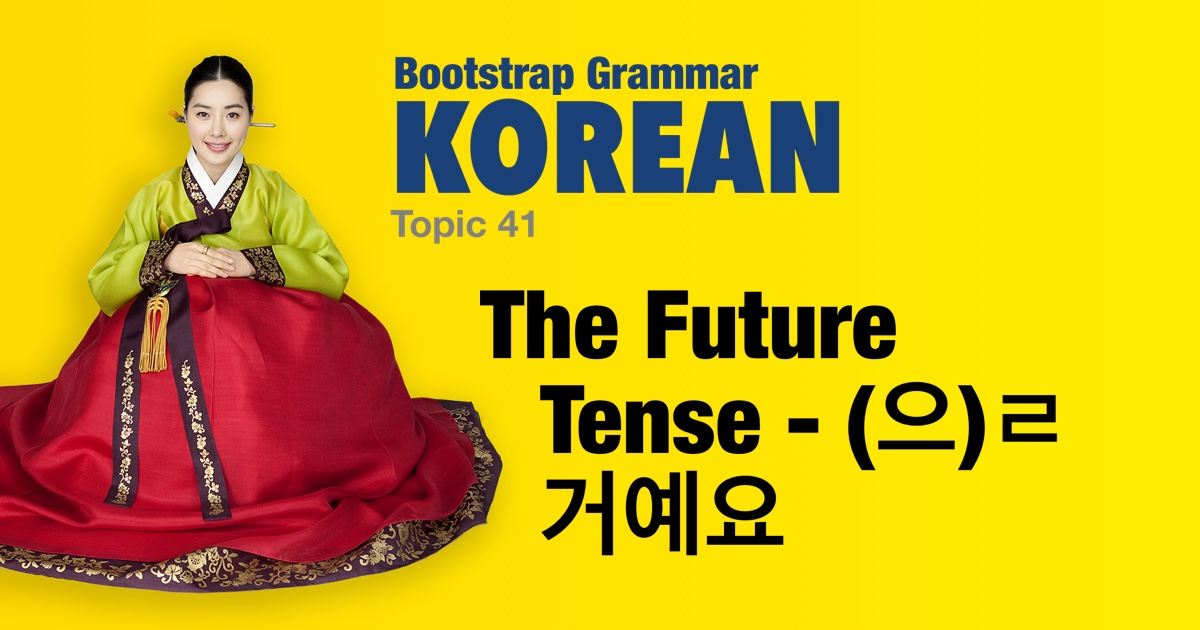Korean grammar - The Future Tense - (으)ㄹ 거예요 |
|||
|
|||
Pattern: Verb stem + (으)ㄹ 거예요 The most common way to form the future tense is the pattern verb stem + (으)ㄹ 거예요. -- Add the 으 if the verb stem ends in a consonant. When used in the first person (I or me) 거예요 is often abbreviated to 게요. This pattern should not be used with the verb 이다. The phrase 일 거예요 is used to state an assumption rather than form the future tense. You will often see (으)ㄹ 거예요 written without a space. Both are correct. |
| Examples: | |
|
김 과장이 올 거예요.
Manager Kim will come.
|
|
|
연주가 노래할 거예요.
Yeonju will sing.
|
|
|
전화가 울릴 거예요.
The phone will ring.
|
|
|
버스를 더 기다릴 거예요.
(I) will wait more (longer) for the bus.
|
|
|
지금 갈게요.
(I) will go/leave now.
|
|
|
일본에 얼마 동안 있을 거예요?
How long will (you) be in Japan?
|
|
|
언니가 나갈 거예요.
(My) (female's) older sister will go out.
|
|
|
가수가 춤출 거예요.
A singer will dance.
|
|
|
방학 동안 뭐 할 거예요?
What are (you) going to do during the school vacation?
|
|
|
명우는 회사에 못 갈 거예요.
Myungwoo won’t be able to go work.
|
|
|
원장님이 제 머리 잘라 줄 거예요.
The director will cut (my) hair.
|
|
|
이웃 사람이 택시를 불러 줄 거예요.
A neighbour will call a taxi.
|
|
|
이제부터 진짜 한국어 공부 열심히 할 거예요.
From now on, (I) will study Korean really hard.
|
|
|
내일은 일찍 일어날 거예요.
(I) will get up early tomorrow.
|
|
|
진석이는 아침에 운동할 거예요.
Jinseok will exercise morning.
|
|
|
다음 주 토요일에 저는 놀이공원에 갈 거예요.
Next Saturday I'm going to an amusement park.
|
|
|
돈을 모아서 언젠가는 새 차를 살 거예요.
(I) will save up some money and buy a new car someday.
|
|
|
금방 갈게요.
(I) will go soon.
|
|
|
준호는 컴퓨터를 사지 않을 거예요.
Junho will not buy a computer.
|
|
|
저는 공부하지 않을 거예요.
I will not study.
|
|
|
제 친구는 스키 타지 않을 거예요.
My friend will not ski.
|
|
|
국이 식을 거예요.
The soup will get cold.
|
|
|
비가 올 거예요.
It will rain.
|
|
|
오늘 반드시 이 일을 끝낼 거예요.
(I) will definitely finish this job today.
|
|
 |
|




